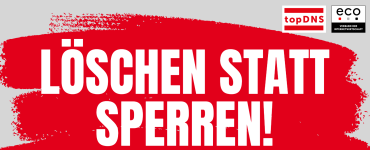- Study from eco – Association of the German Internet Industry shows: Country-specific domain registrations will not reduce as a result of the new gTLDs
- Events like newdomains.org on 27 – 28 October in Munich show the importance the new gTLDs already have
- Lawyer Thomas Rickert, Leader of the Competence Group Names and Numbers Forum at eco sees the development as a “creeping Internet revolution”
In the next few weeks, the introduction of hundreds of new generic Top-Level Domains (gTLDs), such as “.web”, “.blog” or “.mail” will begin, after years of preliminary work. The prognosis of the domain providers is that the new endings’ share of the total domain market will already be significant within five years. This is one finding of the Registrar Atlas 2013* from eco – Association of the German Internet Industry (http://en.eco.de) . According to the Registrar Atlas, one fifth of domain providers in Germany (21 percent) forecast that the share of the new gTLDs will account for up to 25 percent of the total volume of administered domains in this period of time. A further 65 percent of the German domain providers surveyed are anticipating up to ten percent market share.
Lawyer Thomas Rickert, Leader of the Competence Group Names and Numbers Forum at eco, describes this development as a “creeping Internet revolution”. He believes the relevance of the new domain endings for companies is demonstrated by the lively interest in events like the congress newdomains.org.
Experts discuss the consequences of the new TLDs
As the largest event for new Top-Level Domains in Europe, this year’s newdomains.org on the 27 – 28 October in Munich will focus on the impact of the new TLDs for Internet service providers, politics, companies and domain providers. The expert panel “ICANN Contract vs. National Law” led by Thomas Rickert will be discussing the ICANN agreements, based on US law, which are applicable to the new gTLDs: how they conflict with national law, and what solutions are possible in conflict situations. “Many companies will soon be offering endings like “.london” or “.bcn” primarily for customers from the given region. This example clearly represents the issue of whether it is appropriate that also such domain registrations are offered according to US law, which the providers are required to follow”, explains the Competence Group leader from eco. Both the registrars and the domain providers are in a contractual relationship with ICANN, based in Los Angeles, which is responsible for the allocation of the new gTLDs.
No reduction in country-specific domain registrations through new Top-Level Domains
In light of the forthcoming introduction of a multitude of new endings, the question arises as to whether a decline can be expected in the registrations of country-specific Top-Level Domains (ccTLDs) such as “.nl” or “.fr”. According to the results of the study, a large majority of the domain providers expect no reduction in the country-specific endings – 75 percent of respondents in France, 81 percent in Germany, and even 100 percent in Switzerland, the Netherlands and Bulgaria.
The conference newdomains.org is being organized by United-Domains AG in cooperation with eco.
- For the largest international study of the domain industry, eco – Association of the German Internet Industry surveyed almost 300 domain providers from eight countries. The Registrar Atlas 2013 can be downloaded free-of-charge here or at https://numbers.eco.de.



